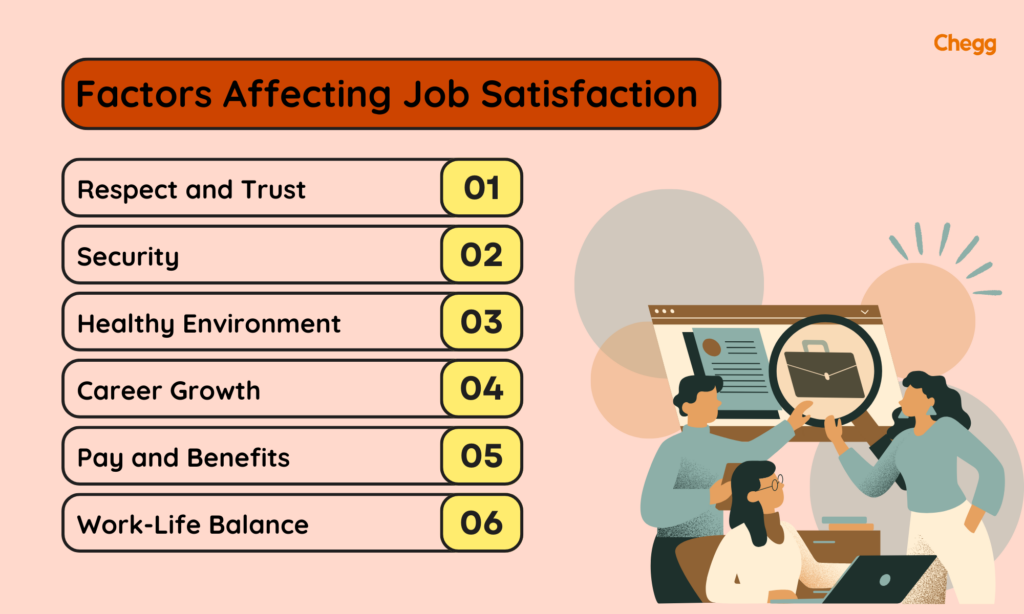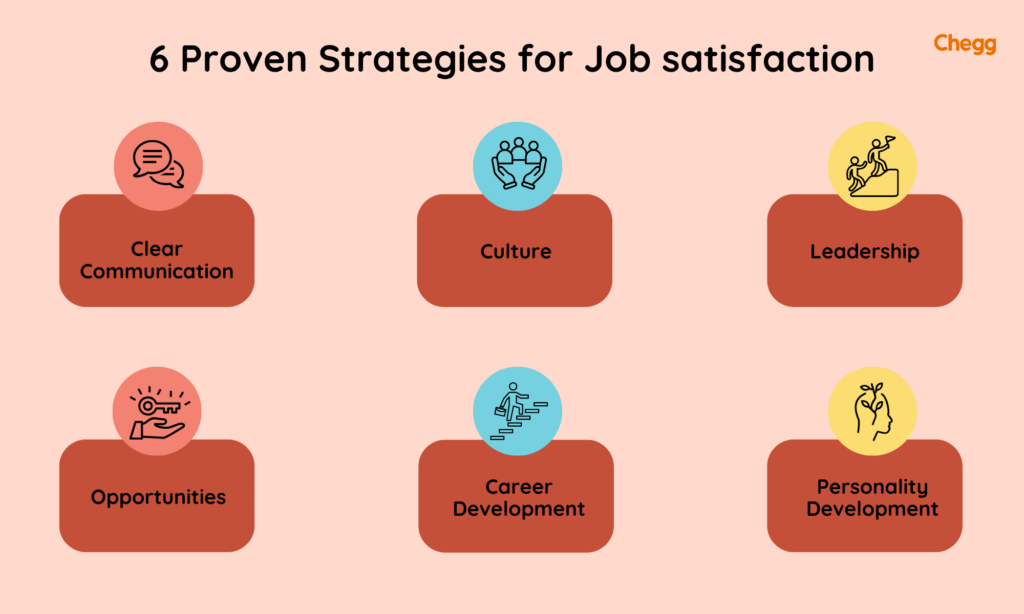
Quick Summary
Table of Contents
If you often find yourself checking the clock or feeling disengaged at work, it may be time to assess your job satisfaction. Job satisfaction refers to how content and fulfilled an individual feels in their work environment, significantly impacting overall well-being, performance, and workplace interactions.
Key factors influencing job satisfaction include compensation, job security, work environment, opportunities for growth, and work-life balance. These priorities vary based on personal preferences and circumstances, with some employees valuing job security over salary, while others prioritize balance over career advancement.
For employers, understanding job satisfaction is crucial to fostering a positive, productive workplace. Job satisfaction research, which includes surveys, interviews, and experiments, helps identify the factors that influence employee contentment and offers strategies to improve it. Studies show that factors like flexible work arrangements can significantly boost employee satisfaction and performance, with 88% of employees indicating motivation from such options, according to PR Newswire.

The goal is to better understand how job satisfaction affects performance and well-being and how to create a more fulfilling work environment.

The job market has become highly competitive, making it essential for employers and employees to understand the factors that contribute to job satisfaction. A study by Payscale revealed that clergy-level workers report the highest levels of job satisfaction, with 90% of them expressing contentment. This high satisfaction is largely attributed to the meaningful work they do, which gives them a sense of purpose.

Job satisfaction varies from person to person, with different employees prioritizing different factors. While some may value meaningful work, others might consider pay, job security, work-life balance, or growth opportunities as more important. It is crucial for firms to identify which factors are most important to their employees and tailor their strategies accordingly. By focusing on these key areas, businesses can create a more positive and motivating work environment.
Improving job satisfaction not only benefits employees but also leads to better business outcomes. Research by Harvard Business Review supports this idea, showing that companies that focus on enhancing job satisfaction experience higher employee retention and improved performance. One of the most important factors for job satisfaction is a positive work environment. Employees prefer a workplace where they feel supported, valued, and comfortable. By investing in these factors, companies can ensure a more engaged and productive workforce.
So, let us explore the top determinants of job satisfaction here.

On the job satisfaction scale, respect and trust are the top needs. Workers who feel respected and trusted are more likely to be high-yielding. They are more committed to their work. The SHRM report pointed the same. 38% of the employees were very satisfied, while 65% felt it was vital and in need.
Firms can build a culture of respect and trust through open talk. Respecting and appreciating their help is vital. Managers can show respect by setting practical deadlines and allowing freedom.
By assigning tasks and allowing them to make decisions, you build trust. This can create a positive work setting. Workers feel valued and inspired to perform their best.
Job security is crucial for employee job satisfaction. When they feel secure, they are more committed and inspired. It found that job security is among the top drivers of employee satisfaction (36%).
Investing in job security can lead to increased employee retention and productivity. Firms with good job security can ensure job satisfaction in organizational behavior. Providing a stable work setting and growth prospects can also attract top talent.
There is a positive link between a healthy work environment and job satisfaction. Employees working in a clean, safe setting are more inspired. Also, a good workplace setting can increase productivity and job satisfaction.
Some tips to ensure that the Workplace is not Toxic –
Such steps can reduce leaves and boost their morale. The job satisfaction theory also proves this.
Offering chances for career growth and development is crucial for employee job satisfaction. Employees who feel they have the scope for progress are more inspired.
To support this, firms can provide training programs and mentoring. Offering new options can help them get new skills to advance in their careers. Firms can boost job satisfaction by fostering a positive work culture. Investing in team growth is beneficial for both.
Pay and benefits play a crucial role in employee job satisfaction. Fair pay and benefits make employees feel valued. They feel respected by their firm. Firms can offer competitive pay packages by conducting regular salary reviews. Also, providing benefits like healthcare and retirement plans is crucial.
Firms can offer non-financial benefits like flexible work setups. Options for professional growth to help employees feel supported can boost job satisfaction.
A healthy work-life balance is the next crucial factor on the job satisfaction scale. Employees with a healthy work-life balance are more engaged and inspired.
Firms can promote work-life balance. They can offer flexible schedules, telecommuting options, working conditions, and time-offs. This allows employees to balance their work duties with their personal life.
Firms should enable employees to disconnect from work outside of work hours. This will avoid burnout and support well-being.
Job satisfaction is essential for both employees and employers. It directly affects the well-being of workers, influencing their overall happiness and motivation at work. When employees are satisfied, they feel more engaged, valued, and committed to their roles. This leads to better job performance and a positive work environment.
For firms, job satisfaction is equally important as it plays a significant role in improving productivity and reducing turnover rates. Satisfied employees are more likely to stay with the company, reducing hiring and training costs. Moreover, when employees feel content, they are more likely to contribute positively to the company’s growth and success. Therefore, focusing on job satisfaction benefits both individual employees and the organization as a whole.
Here are some key points highlighting the importance of job satisfaction –
But how can you gain job satisfaction?
Based on many theories of job satisfaction, let us explore the strategies.
There are several factors that contribute to job satisfaction, but ensuring each of them is addressed can be challenging. To effectively manage these factors, it is essential for firms to develop clear plans and policies. These guidelines can help identify key areas that influence employee satisfaction and provide a structured approach to addressing them.
Having well-defined plans and policies will also ensure that employees clearly understand work expectations. When employees know what is expected of them and feel supported in their roles, their satisfaction increases. By creating a transparent and supportive work environment, firms can improve job satisfaction, which leads to higher productivity and retention rates. This approach benefits both the employees and the organization.
The top strategies are as follows –

Clear communication is essential for maintaining job satisfaction. When communication is open and straightforward, employees understand their roles, tasks, and expectations. This helps reduce confusion and frustration, leading to a more positive work environment.
On the other hand, unclear communication can cause misunderstandings and irritate employees. When workers aren’t sure about what’s expected of them or the direction the company is heading, it can lead to stress and dissatisfaction. To avoid these issues, firms must prioritize effective communication, ensuring that all employees are well-informed and confident in their work. This fosters a sense of trust and satisfaction, ultimately improving overall productivity and morale.
Firms can promote clear communication by –
A positive workplace culture plays a significant role in enhancing job satisfaction. When employees feel respected and valued, they are more likely to be engaged and motivated in their work. A supportive and inclusive culture fosters a sense of belonging, making employees feel connected to their teams and the organization.
A culture of respect not only boosts morale but also encourages open communication, collaboration, and trust. When employees feel appreciated, they are more likely to contribute their best efforts and stay committed to their roles. By promoting a positive work environment, companies can improve job satisfaction, increase productivity, and retain talented employees. A respectful workplace culture is essential for long-term success.
Firms can promote a positive culture by –
Strong leadership is key to enhancing job satisfaction. Effective leaders inspire and motivate their teams by setting clear goals, providing encouragement, and recognizing achievements. Their ability to lead by example creates a positive work environment where employees feel valued and driven to perform at their best.
In addition, good leaders offer support and guidance, helping employees navigate challenges and grow in their roles. They foster a sense of trust and openness, ensuring that team members feel comfortable sharing ideas and concerns. When leadership is strong, employees feel more confident in their work and more satisfied with their job. This leads to higher engagement, productivity, and overall success for the company.
Firms can promote strong leadership by –
Offering opportunities for new challenges and growth can significantly boost job satisfaction. When employees are given the chance to take on new responsibilities or develop new skills, they feel more engaged and motivated. These opportunities allow them to grow both personally and professionally, which leads to greater job fulfillment.
Employees who see clear paths for progress within their roles are more inspired to perform well. When individuals believe they have the potential for advancement, they are more likely to stay committed and contribute to the organization’s success. Providing growth opportunities not only improves job satisfaction but also benefits the company by fostering a motivated and skilled workforce.
Firms can do so by –
Career development is another crucial factor in job satisfaction. When employees feel that they are growing and advancing in their careers, they are more likely to be engaged and satisfied with their work. Opportunities for learning, skill-building, and promotions give employees a sense of progress and achievement.
Employees who see a clear path for development are more motivated and committed to their roles. This sense of growth not only enhances their job satisfaction but also increases loyalty to the company. By offering career development opportunities, companies can boost employee morale, reduce turnover, and foster a more productive and satisfied workforce.
Firms can offer growth options such as –
Investing in employees’ personal growth and personality development can greatly enhance job satisfaction. When companies provide opportunities for employees to develop soft skills, emotional intelligence, and leadership abilities, employees feel valued and supported. This focus on personal growth contributes to a positive work experience.
Employees who feel empowered to grow both professionally and personally are more motivated and engaged in their work. This investment in their development boosts their confidence and satisfaction, leading to improved performance and a stronger commitment to the company. By supporting personal and personality development, companies can create a more positive and productive work environment, benefiting both the employees and the organization as a whole.
Firms can do so by –
Job satisfaction is crucial for both employees and firms. It impacts employee engagement, productivity, and retention, leading to better outcomes. Firms can improve job satisfaction by focusing on many factors. The common ones are:
To cultivate job satisfaction it is essential to align your values, interests, and skills with your chosen profession. Seek opportunities for growth and development, foster positive relationships with colleagues and superiors, and create a work-life balance that promotes well-being.
Remember, your career journey is a personal one, and finding job satisfaction is a continuous process. By prioritizing your fulfillment, you can create a meaningful and rewarding professional life that brings you joy and purpose.

In conclusion, job satisfaction is a vital element of any successful workplace. It not only affects individual well-being but also influences overall productivity and performance. Understanding what factors contribute to job satisfaction is essential for both employees and employers to create a positive work environment. By recognizing the different needs and preferences of employees, companies can take steps to improve satisfaction levels and foster a more engaged workforce.
For employees, job satisfaction directly impacts motivation, job performance, and long-term career success. When workers feel content and valued, they are more likely to stay with the company, perform well, and contribute to its growth. Therefore, understanding personal needs such as job security, work-life balance, and opportunities for growth can guide individuals in making informed decisions about their careers.
Employers, on the other hand, benefit from paying attention to job satisfaction as it leads to higher retention rates, lower turnover, and improved productivity. Offering competitive pay, job security, flexible work arrangements, and growth opportunities can create a more satisfied and loyal workforce. Ultimately, fostering job satisfaction is a win-win situation for both employees and employers, resulting in a more harmonious and efficient workplace.
Ans. The key factors to satisfaction are as follows:
1. Honour and appreciation from management
2. Options for career progress and personal growth
3. Positive links with team members and seniors
4. Fair pay and benefits
5. Work-life balance and flexible plans
6. Meaningful and fulfilling work tasks
7. A sense of purpose to work for the firm values
8. Options for skill development and training.
Ans. The are many factors affecting job satisfaction. The prime ones are as follows:
1. A confirming and collaborative work setting
2. Clear communication and expectations from management
3. Options for career growth and development
4. Good team and management
5. Efficient pay structure
6. A healthy work-life balance
These factors are critical in ensuring employee engagement and motivation in their work.
Ans. To gain job satisfaction, employees can consider the following steps:
1. Communicate with management about expectations and needs.
2. Take benefit of chances for growth and development.
3. Maintain a healthy work-life balance.
4. Focus on self-care.
5. Seek a supportive work setting and positive links with team members.
6. Find meaning and purpose in work.
7. Focus on areas of interest and strength.
Ans. Job satisfaction has a direct impact on employee performance. Satisfied employees are more motivated, productive, and committed to their work. They are more likely to go above and beyond in their roles, contribute positively to the team, and stay with the company long-term, resulting in improved overall performance and lower turnover rates.
Ans. Employers can improve job satisfaction by offering competitive pay, clear communication, opportunities for career growth, and a positive work environment. Providing recognition, fostering strong team relationships, and promoting work-life balance are also key. Regular feedback and supporting employee development can help create a workplace where employees feel valued, motivated, and engaged.

Authored by, Amay Mathur | Senior Editor




Amay Mathur is a business news reporter at Chegg.com. He previously worked for PCMag, Business Insider, The Messenger, and ZDNET as a reporter and copyeditor. His areas of coverage encompass tech, business, strategy, finance, and even space. He is a Columbia University graduate.
Editor's Recommendations
Chegg India does not ask for money to offer any opportunity with the company. We request you to be vigilant before sharing your personal and financial information with any third party. Beware of fraudulent activities claiming affiliation with our company and promising monetary rewards or benefits. Chegg India shall not be responsible for any losses resulting from such activities.
Chegg India does not ask for money to offer any opportunity with the company. We request you to be vigilant before sharing your personal and financial information with any third party. Beware of fraudulent activities claiming affiliation with our company and promising monetary rewards or benefits. Chegg India shall not be responsible for any losses resulting from such activities.